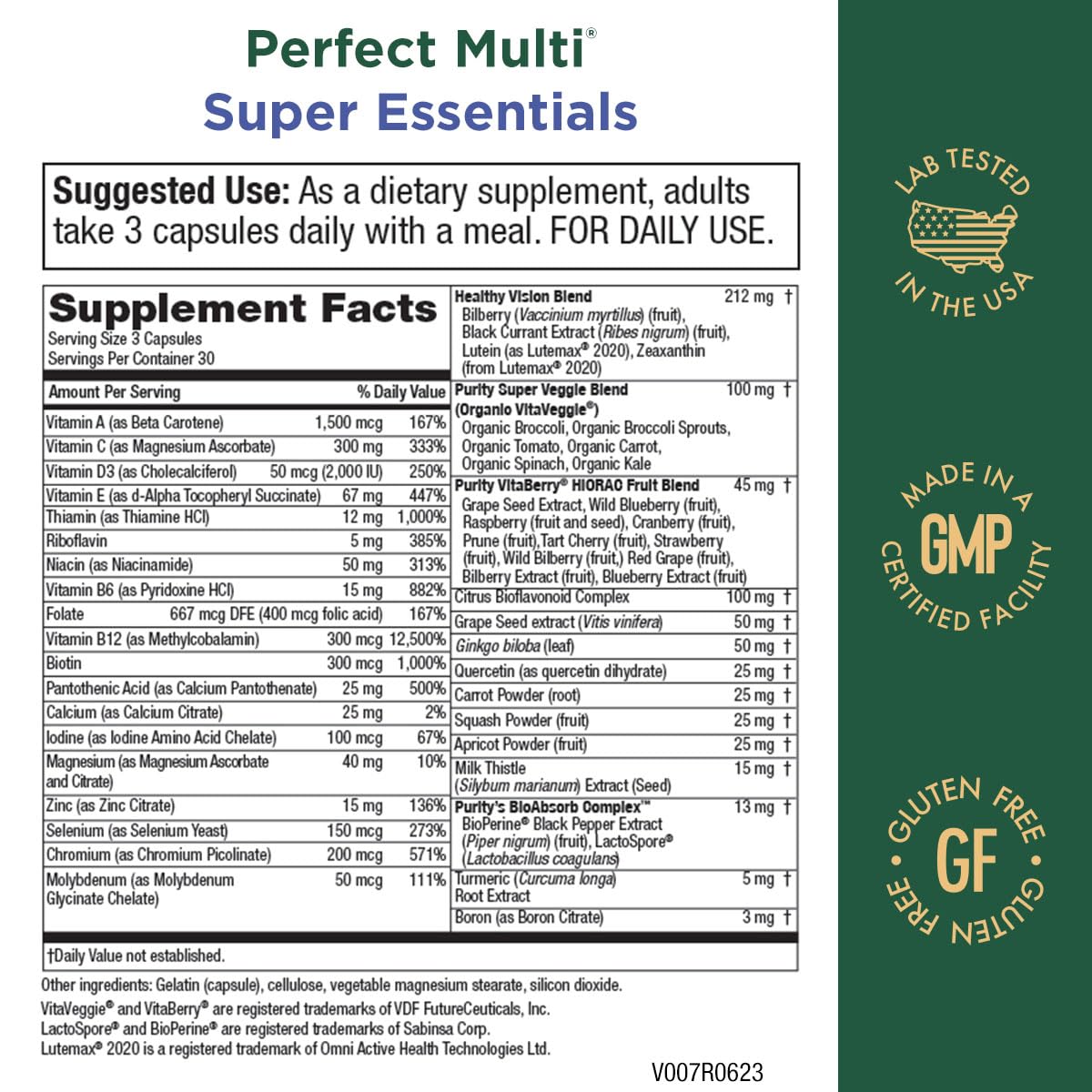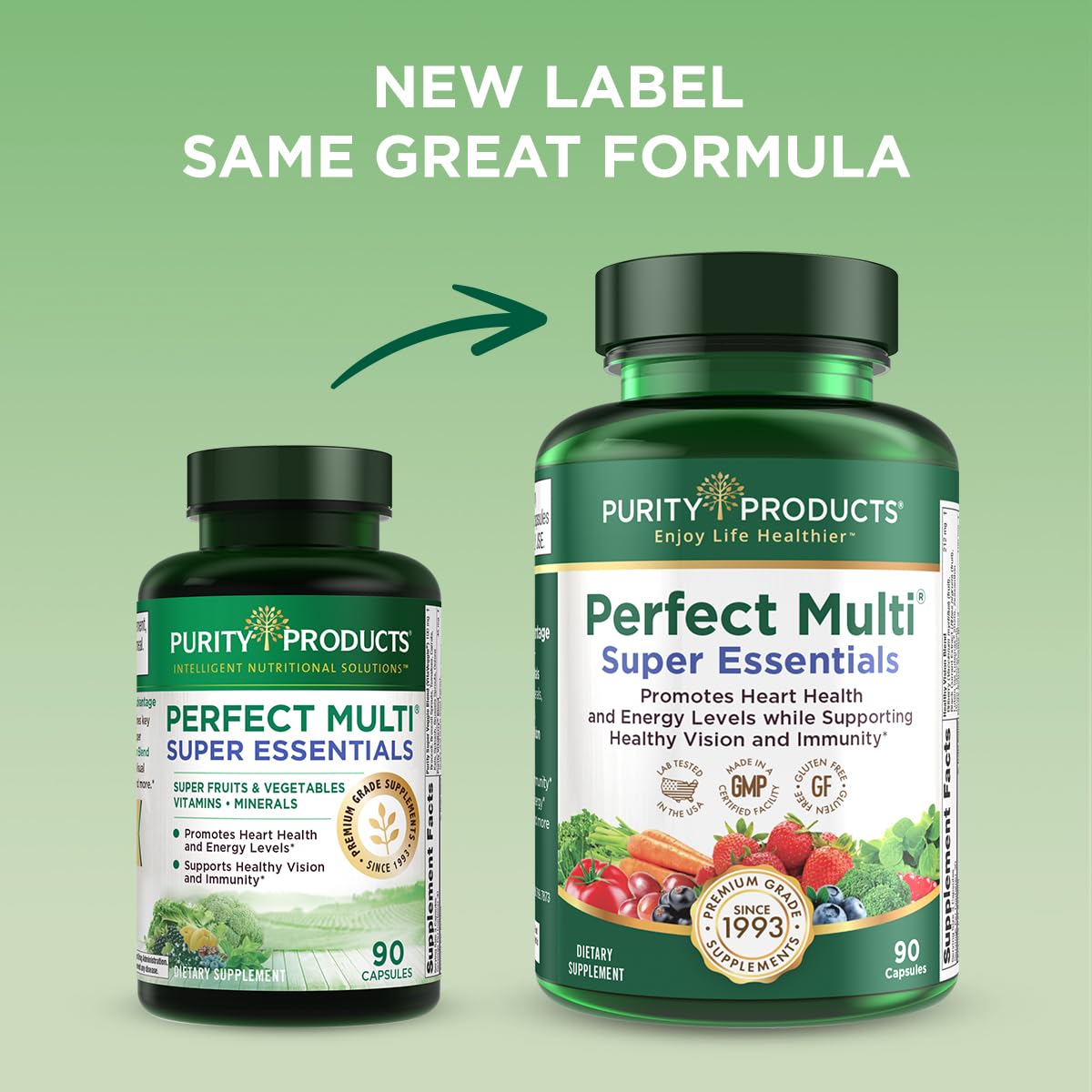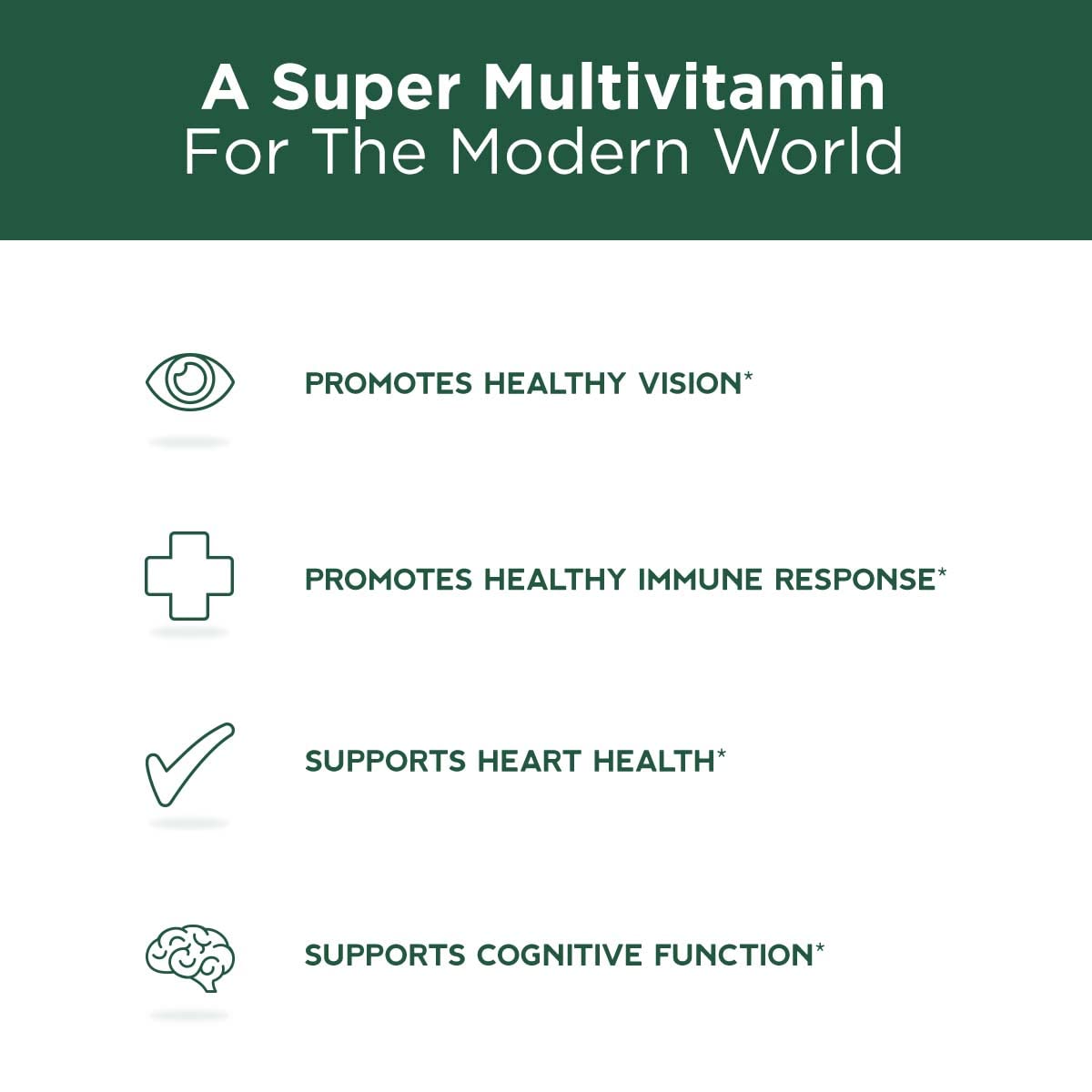Sobre nosotros
Servicios al cliente
Atención al cliente
Acceso Regional
Legales y políticas
Obtén la aplicación

Apunta tu cámara para descargar la aplicación
Copyright © 2024 Desertcart Holdings Limited






🌟 Unlock Your Potential with Every Capsule!
Purity Products Perfect Multi Super Essentials is a powerful multivitamin that combines essential nutrients with whole food and super fruit extracts. Designed to support heart, immune, brain, and skin health, it features Lutein and Zeaxanthin to promote healthy vision both day and night. With 90 capsules, this supplement is your go-to for comprehensive wellness and sustained energy.
P**K
Purity Vitamins Super Greens
I have used for many years. They are the best value .
J**1
Multivitamin
I really like it.
B**L
GREAT QUALITY, PROPER DOSE MULTI-VITAMIN
THIS MAKES PICKING THE RIGHT EVERYDAY VITAMIN FOR ANY AGE, FOR IMPROVING EVERYDAY LIFE AND KEEPING YOUR IMMUNE SYSTEM IN GOOD SHAPE. IF YOU HAVE NEVER TAKEN GOOD VITAMINS, TRY THIS FOR A FEW WEEKS AND SEE HOW MUCH BETTER YOU FEEL.
J**E
Size of bottle, and supplements included not the same as previous orders.
This did not have the same supplements included as previously ordered. Size of bottle was half of what my previous order included for same price. Very deceiving.
M**3
It's a vitamin.
Nothing to really say about this as vitamins need time to take effect. No immediate change that made my life better but I wouldn't not recommend it either. The only curious thing is that you have to take 3.
J**I
Five Stars
Outstanding product. Exactly what I expected to receive and received it quickly!
F**S
Very Good Multiple Vitamin - Similar to Nature's Way Alive 50 Plus
This PERFECT MULTI SUPER ESSENTIALS product from PURITY PRODUCTS gives you a 30 day supply of multiple vitamins in 3 capsules. The ingredient list is difficult to read because it is printed on the back of the label, so you have to peel it away to view the contents. I find this very annoying, as it makes it difficult to quickly see the supplement facts. Normally, I alternate between taking Kirkland’s Signature Mature Multi vitamins, because it was rated number one by Consumer Reports (see information below) and Nature’s Way Alive 50 Plus, because it has a lot of extra ingredients that I believe are good for my body. I split both of these vitamins in half (both have a 1 pill serving size) and take one in the morning and another in the evening. Another reason I alternate these two brands is that the Nature’s Way brand is a high potency vitamin, which according to Consumer Reports, is too much of a good thing…and I agree.I am not a nutritionist, but in my humble opinion this PERFECT MULTI SUPER ESSENTIALS product appears to be similar (but not exactly the same) to the Nature’s Way Alive 50 Plus brand, except that it is low in calcium and has no Vitamin K or Potassium. However, it does have Vitamin A (100% as Beta Carotene), which is a plus. I also like that a serving size equals 3 capsules. This allows me to take just 2 capsules per day, thereby reducing the potency of the vitamin, while still getting the extra ingredients that I want. I have been taking this brand now for a few weeks and continue to alternate this vitamin with the Kirkland Signature Mature brand, which I think is the best option for my needs.I also very much like that the PERFECT MULTI SUPER ESSENTIALS label is marked with a number and an expiration date. However, when I rate supplements an important consideration for me is whether or not the supplement has been tested by an independent lab. The well-respected PBS show FRONTLINE recently aired an excellent program about the largely unregulated supplement industry. It suggested that consumers ask five questions, when considering which supplements to purchase. One of the questions was: Has the product been tested by an independent lab? The bad news is that this PURITY PRODUCTS PERFECT MULTI SUPER ESSENTIALS product label does not have an independent lab seal on it (not on the front nor on the back) so I have no way of knowing (or being reasonably certain) that this product is what it claims to be.All-in-all, I like this supplement very much, but cannot in good faith give it 5 stars without a good rating from an independent lab. In full disclosure, I wish to state that I received this product at a significant discount, in exchange for writing an honest and unbiased review. Here is some information about supplements that I sourced from the PBS FRONTLINE show and from CONSUMER REPORTS, which may be helpful:INFORMATION ABOUT SUPPLEMENTS from PBS FRONTLINE:Compared to most drugs sold at pharmacies, health supplements are loosely regulated by government agencies. Law prohibits manufacturers from selling products that are adulterated or mislabeled, and they cannot claim to cure things they don’t. But there is little oversight or enforcement to ensure they comply. And unlike prescription drugs, which pass through a strict premarket approval process, the Food and Drug Administration does not evaluate a supplement’s contents or effectiveness before it hits the shelves. Even then, the agency has only a modest capacity to test the pills.The result is a more than $30 billion industry that is largely regulated by the honor system. Given this framework, there is little to guarantee that any vitamin, mineral, probiotic, sports supplement, herbal treatment, or other dietary supplement is safe, effective, or even contains what’s on its label. Last year, for example, an investigation by the New York Attorney General’s office found that several popular store-brand supplements at four major retailers — GNC, Target, Walgreens and Walmart — contained contaminants not listed among the labeled ingredients. Just 21 percent of them actually had the DNA of the plant species they purported to be vending.While there are no guarantees, there are steps consumers can take to improve the chances that their supplements contain what they claim to, in the labeled quantities, and that they may indeed have a health benefit. Here are five questions a consumer may want to ask when considering supplements.1. Has the product triggered any health warnings or sanctions?Searching for a product or its maker on the FDA’s website will unearth any safety advisories or sanctions issued against them. The agency also maintains a list of all recent recalls and market withdrawals. Because the supplement industry is constantly releasing new products, a product may be dangerous even if there are no advisories against it. A few minutes of online research may reveal key concerns about a supplement or its producer; the FDA has tips for searching the Web for information on supplements. Researching individual ingredients can also be productive. For instance, Consumer Reports compiled a list of the “dirty dozen”: Twelve ingredients linked to serious adverse health effects, but that remain on shelves. The Federal Trade Commission also has a list of substances that have raised safety concerns.2. Has the product been tested by independent labs?Gaps in regulation have led to lapses in quality, even among mainstream brands. For instance, the New York Attorney General’s tests found that pills labeled as medicinal herbs sometimes contained little more than fillers like rice or houseplants. In some cases, supplements were filled with substances that could be harmful to those with allergies. Similar results were reached by researchers at the University of Guelph in Canada, who in 2013 DNA tested 44 herbal products from a dozen companies. They found that only two of the companies had products without any substitution, contamination or fillers in their products. A handful of private, independent nonprofits have stepped in to partially fill gaps in regulation, inspecting some dietary supplements and reporting the results. The United States Pharmacopeial Convention (USP) runs a voluntary program to inspect and certify the quality of a company’s products and facilities. Those that pass can place the organization’s yellow and black “USP Verified” seal on their product — less than 1 percent of all supplements on the market have this label. The international public health nonprofit NSF International runs a similar program aimed at sports supplements. Two other organizations, ConsumerLab.com and LabDoor, randomly test dietary supplements and report their findings. Both groups provide general review information for free; full results are accessible to paid members. ConsumerLab has also aggregated a long list of health warnings and recalls for more than a decade.3. Is the product too good to be true?Supplement producers are prohibited from making unfounded claims of health benefits — which is why many avoid declarations like “cures disease” in favor of softer assertions like “supports immunity.” Nonetheless, it is not uncommon to find pills that make overzealous claims. Such instances are red flags that a product may be fraudulent in other ways, according to the FDA. So before taking a supplement, consider what is being offered. Is it being sold as a miracle cure? A magic pill? A wonder drug? The FDA says consumers should beware of products that claim to do it all, and to do so instantly. Experts warn that products that primarily offer evidence in the way of personal testimonials are worthy of skepticism, as are products that use suspect medical jargon, like these examples offered by the FTC: “molecule multiplicity,” “glucose metabolism,” “thermogenesis,” or “insulin receptor sites.” And just because something is labeled “natural” is no guarantee that it is safe to consume. There are millions to be made through medical fraud, so consumers are asked to consider how they heard about a product. If the person recommending or prescribing it stands to gain financially, they may not have a consumer’s best interest at heart. Many manufacturers offer money-back guarantees, no questions asked. But getting that money back may prove difficult or impossible. “Marketers of fraudulent products rarely stay in the same place for long,” writes the FDA’s division of emergency preparedness. “Because customers won’t be able to find them, the marketers can afford to be generous with their guarantees.”4. Is there evidence that the supplement does what it promises?Thousands of studies have been conducted on the effect of various substances on the human body. The National Institutes of Health has summarized what is known about the most commonly consumed supplements — vitamins and minerals — in a series of fact sheets. These explain how each vitamin or mineral behaves in the body, and the scientific evidence behind its health impacts. The U.S. National Library of Medicine’s MedlinePlus has similar information about other drugs, herbs and supplements. For a deeper dive into the science behind a specific supplement, explore the Library of Medicine’s PubMed Dietary Supplement Subset. The database includes scientific literature on vitamin, mineral, phytochemical, ergogenic, botanical, traditional Chinese medicine, and herbal supplements in humans and animal models. Resources are also available for certain groups: The Department of Defense offers information about the safety of specific supplements to service members. Older adults can find resources aimed at them created by the FDA, the Federal Trade Commission, National Institute on Aging, and NSF International.5. Do I really need supplements? If so, am I taking the right amount?Health experts will say that your doctor is the best person to consult on whether vitamins or supplements are appropriate for you, and a pharmacist or registered dietitian may also have valuable input. People taking medications should exercise particular caution, since some supplements can interfere with their treatment. As you research a supplement, think about dosage. Some otherwise safe vitamins and minerals can cause health problems if they are taken in excess. The Institute of Medicine’s Food and Nutrition Board produces recommended daily dietary allowances as well as tolerated upper intake levels. Also worth considering is that a supplement may have considerably higher quantities of a vitamin or mineral than it says on the bottle. Because certain vitamins degrade over time, manufacturers often provide more than the labeled quantities, to ensure there is still the labeled amount at the expiration date. The federally funded Dietary Supplement Ingredient Database hosts a multivitamin/mineral calculator that estimates the true quantity of a vitamin or mineral in a pill based on its labeled quantity.INFORMATION from CONSUMER REPORTS:Large clinical trials have found that taking vitamins and mineral supplements, including multivitamins, doesn't lower the risk of disease compared with not taking a multivitamin. Most recently, researchers from the Women's Health Initiative, who tracked more than 161,000 women, concluded that women who took the pills had no lower risk of cancer, cardiovascular disease, or death from any cause over an eight-year period than those who didn't. In the Dietary Guidelines for Americans report released in June 2010, the Department of Agriculture says that daily multivitamin/multimineral supplements do not offer "health benefits to healthy Americans" and urges consumption of a balanced diet plus, when needed, supplements of nutrients like calcium, vitamin D, and B12. If you still decide to take a multivitamin, our tests show that you can get a good one for very little money. What's more, we found that store brands did just as well in our tests as national brands, at a lower price. The biggest winner: Costco's Kirkland Signature, whose regular, "mature," and children's multis cost a nickel or less a day. Use the Ratings, note the nutrient doses, and buy by price. In addition, follow these guidelines:• Avoid megadoses. In general, look for no more than 100 percent of the Food and Drug Administration's Daily Value of the essential vitamins and minerals (one exception is vitamin D, for which the DV is just 400 IU, less than what many people should take). Avoiding big doses is especially important with vitamin A: Just 200 percent of the DV of the retinol form, sometimes listed on labels as vitamin A acetate or palmitate, can increase the risk of birth defects and liver damage.• Look for products that don't exceed about 3,000 IU of vitamin A (2,300 IU for women), or 60 percent of the DV, ideally with at least a third from beta-carotene, the safer form of the vitamin. (Smokers shouldn't take beta-carotene because it may increase their risk of lung cancer.)• Ignore special claims and add-ons. Claims for benefits such as weight control or increased energy are generally unsubstantiated. Even if botanical ingredients, food extracts, and other substances like lutein and lycopene did have a benefit, the amounts in a multivitamin are probably too small to have any effect.• Consider a multivitamin geared to your age or gender. Men's and senior formulas usually don't contain iron, which is good because those groups generally don't need extra iron, and it can lead to organ damage in people with hemochromatosis, a genetic disorder that causes excessive iron buildup. Senior formulas may also contain more vitamin D. Women's vitamins may have some extra calcium, though rarely enough to meet the daily requirement without the need for a separate supplement.
J**I
Good for health
Awesome vitamin!!!
Trustpilot
Hace 1 semana
Hace 3 semanas